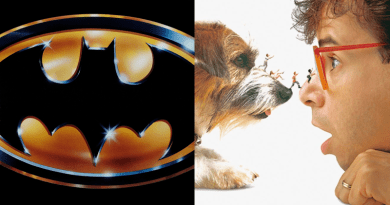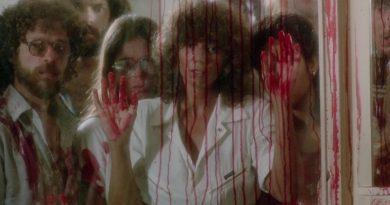The Silence of the Lambs at 30: Not Your Usual Valentine’s Day Movie
Thirty years ago, who could have thought that releasing a certain psychological thriller called The Silence of the Lambs on February 14 or more specifically, on Valentine’s Day turned out to be a huge gamble worth risking for?
Of course, back then, nobody could have predicted a movie like this would become a major box-office hit. According to a Deadline interview with The Silence of The Lambs director Jonathan Demme published on February 17, 2016, “it was [his] idea to release [the] film on Valentine’s Day“.
As odd as it may sound, the gamble paid off exquisitely with some fava beans and a nice Chianti. The Silence of the Lambs secured the No. 1 spot during the opening weekend, earning US$13.7 million and remained on top for five consecutive weeks until Teenage Mutant Ninja Turtles II: The Secret of the Ooze finally toppled the movie by the sixth week. By the time the movie completed its theatrical run, The Silence of the Lambs managed to pick up US$131 million in the stateside alone with a worldwide total of US$272.7 million. Nevertheless an impressive feat, especially given its US$19 million budget.
For decades, I viewed The Silence of the Lambs mainly as a psychological thriller but my recent revisit made me watched the movie from a different perspective. The kind which finally made sense why Demme chose to release the film on Valentine’s Day. Beyond all the psychological-thriller tropes, there’s an underlying love story between FBI trainee Clarice Starling (Jodie Foster) and the cannibalistic psychiatrist-serial killer Dr Hannibal Lecter (Anthony Hopkins). Not a conventional romantic drama but more of sicked and twisted way about how Lecter is attracted to Clarice from the first moment he laid eyes on her.
He also happens to be protective of her, which can be seen after his cellmate Miggs (Stuart Rudin) harassed Clarice on her way out of the cell block by throwing semen on her face. Following the incident, Lecter somehow managed to talk Miggs into swallowing his own tongue. Although Jack Crawford (Scott Glenn), the supervising agent-in-charge from the FBI’s Behavioral Science Unit division pointed out that Miggs’ death was a result of “Lecter did it to amuse himself”, it was frankly more of Lecter’s form of punishment against him for being disrespectful to Clarice.
Lecter’s interest in Clarice continues during a quid pro quo sequence as he agrees to trade what he knows about the wanted serial killer Buffalo Bill (Ted Levine, who delivered a perfectly creepy performance) in exchange for her personal information. In another scene, Clarice had her last face-to-face meeting with Lecter, it ends with him touching her finger when she runs over to take back her case file. Lecter’s love for Clarice may not be traditionally pronounced but his ongoing mutual admiration can be evidently seen in the movie. Even Lecter’s subsequent escape doesn’t end up with him tracking down Clarice and kill her like other victims. At one point, there’s a scene where she learned about his escape and convinced her fellow FBI trainee, Ardelia Mapp (Kasi Lemmons) that “he won’t come after [her] [because] he would consider that rude”.
Of course, all of this wouldn’t have worked if not for Anthony Hopkins and Jodie Foster’s memorable onscreen chemistry. Interestingly enough, the amount of time where they shared the same screen together was actually a short one. This was especially true since Hopkins’ screen time totalled less than 20 minutes. A result that was oddly more than enough to earn him an Oscar for Best Actor, beating other stiff contenders such as Warren Beatty for Bugsy and Robert De Niro for Cape Fear. And it was a well-deserved win for Hopkins too. The performance of a lifetime that it’s hard to imagine anyone else to pull off such a charming yet deeply disturbing role as Dr Hannibal Lecter. Others did play the same role both before and after including Brian Cox (1986’s Manhunter), Gaspard Ulliel (2007’s Hannibal Rising) and Mads Mikkelsen (TV’s Hannibal). While I do enjoy both Cox and Mikkelsen’s respective takes on the iconic role, none of them beat the kind of nuance that Hopkins portrayed to such mesmerising effect in this movie.
Jodie Foster holds her own well enough with one of her most unforgettable performances to date. Just like Hopkins, she also went home with an Oscar for Best Actress. Speaking of Oscar, The Silence of the Lambs famously won all five major Academy Award nominations including the aforementioned two acting awards as well as Best Picture, Best Director and Best Adapted Screenplay from Ted Tally. Not to mention it was a rare feat for a genre movie like The Silence of the Lambs to win such prestigious awards.
Kudos also go to Jonathan Demme for his impeccable direction that successfully set the mood and tone of the movie, alternating between moments of escalating tension and foreboding sense of dread with flashes of graphic violence. At the time of the release, it’s hard to believe that Demme actually manages to pull it off remarkably well. Besides, prior to The Silence of the Lambs, his works were largely comedies seen in the likes of Melvin and Howard (1980), Something Wild (1986) and Married to the Mob (1988). Demme would go on to make a few more high-profile Hollywood films ranging from Philadelphia (1993) to The Manchurian Candidate remake (2004) until his death in 2017 due to oesophagal cancer and heart disease at the age of 73. His last movie was Ricki and the Flash, a musical dramedy starring Meryl Streep.




